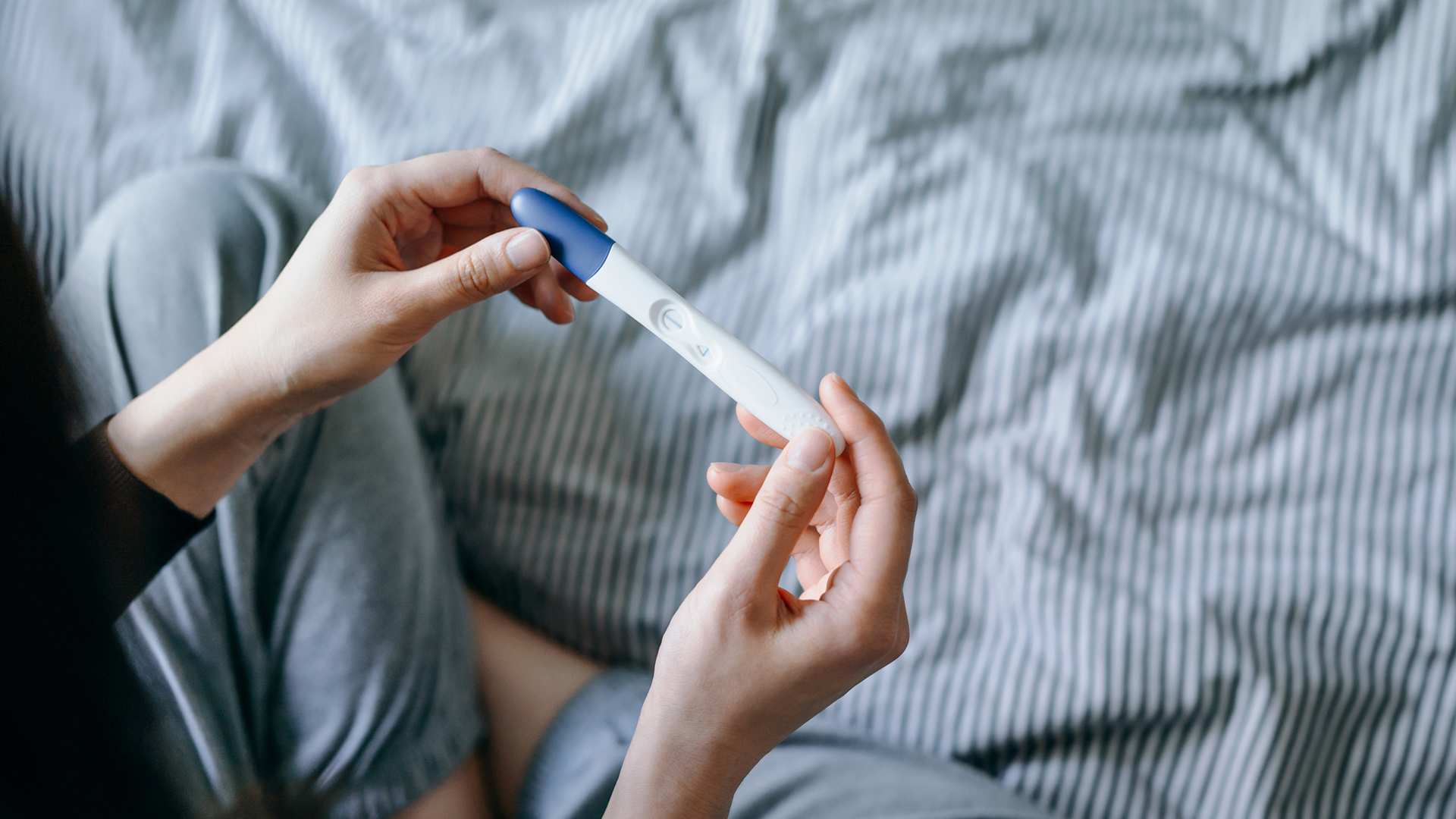6 myths about miscarriage
While miscarriage is common, secrecy about pregnancy loss has lent itself to pervasive myths. Our experts debunk the most common myths about miscarriage here

Get the world’s most fascinating discoveries delivered straight to your inbox.
You are now subscribed
Your newsletter sign-up was successful
Want to add more newsletters?

Delivered Daily
Daily Newsletter
Sign up for the latest discoveries, groundbreaking research and fascinating breakthroughs that impact you and the wider world direct to your inbox.

Once a week
Life's Little Mysteries
Feed your curiosity with an exclusive mystery every week, solved with science and delivered direct to your inbox before it's seen anywhere else.

Once a week
How It Works
Sign up to our free science & technology newsletter for your weekly fix of fascinating articles, quick quizzes, amazing images, and more

Delivered daily
Space.com Newsletter
Breaking space news, the latest updates on rocket launches, skywatching events and more!

Once a month
Watch This Space
Sign up to our monthly entertainment newsletter to keep up with all our coverage of the latest sci-fi and space movies, tv shows, games and books.

Once a week
Night Sky This Week
Discover this week's must-see night sky events, moon phases, and stunning astrophotos. Sign up for our skywatching newsletter and explore the universe with us!
Join the club
Get full access to premium articles, exclusive features and a growing list of member rewards.
The beginning of pregnancy can be daunting enough without the myths around miscarriage adding to feelings of uncertainty and anxiety. If you’ve suffered a miscarriage, you are not alone. Between 10-20% of pregnancies end in miscarriage (or around 1 million a year in the U.S.). But that doesn’t make it any less devastating, especially if it happens more than once.
Common advice is that women should wait until the end of the first trimester before announcing a pregnancy so this can add to the stigma, says Dr. Zev Williams, an obstetrician at the Albert Einstein College of Medicine and the Montefiore Health System in New York. And because it is medically common, the impact of miscarriage is often underestimated. “Miscarriage is a traditionally taboo subject that is rarely discussed publicly,” he says.
The good news is that most women (approximately 85%) who miscarry will go on to have a healthy pregnancy later, according to the American Pregnancy Association.
In this article, we talk to the experts about the myths about miscarriage. Here are some of the most pervasive misconceptions — and the truth about early pregnancy loss.
1. Miscarriage is rare
“Miscarriages are a lot more common than you’d think,” says midwife Kate Taylor, from The Pep Midwives, “The more we talk about it, the more we can normalize it and reduce the stigma, which can reduce feelings of shame and blame.”
“Because early miscarriage is so common, many people choose to wait until after the 12 week mark to tell friends and family about their pregnancy,” adds Dr. Evangelia Elenis, chief physician in Obstetrics and Gynecology, and chief medical advisor AI-led fertility app Tilly.

Dr Elenis is a chief physician in Obstetrics and Gynecology, and a subspecialist in Reproductive Medicine. She is a PhD and affiliated researcher at Uppsala University with postdoctoral studies at Harvard Medical School.
“There are also late miscarriages that happen from weeks 12-24, but these are are significantly less frequent, occuring in about 1-2% of pregnancies, as well as recurrent miscarriages, which is when a person has more than three consecutive miscarriages – although this diagnosis varies by country. The diagnosis of recurrent miscarriages is uncommon and given to a very small percentage of women, around 1%.”
Get the world’s most fascinating discoveries delivered straight to your inbox.
Dr. Elenis adds: “Of those that experience early miscarriage, it is absolutely possible to have a healthy pregnancy in the following months, and there is no physiological evidence supporting a delay in pregnancy after miscarriage. In fact, studies have found that couples who tried in the three months after early miscarriage, compared with those who waited longer than three months to try again, were more likely to achieve a healthy birth and have a shorter time to pregnancy.
“This is not, however, the case for recurrent miscarriages, and it’s very important to consult your doctor if you have experienced two or three miscarriages in a row, but be aware guidelines differ between countries.”
2. Miscarriage is the mother’s fault
The phrase ‘miscarriage’ might imply something went wrong in the carrying of the baby, and often women blame themselves – but they shouldn’t.
Dr. Elenis says: “It’s very rare for it to be the woman’s fault with miscarriage, as most early miscarriages are caused by chromosomal abnormalities (when the fetus is essentially not healthy), so this is completely out of our control.
“While this might sound serious, it’s important to know that no one has only eggs and sperm with normal chromosomes. In fact, this is also one of the reasons why people don’t become pregnant every time they have sex, especially during ovulation: unhealthy eggs and sperm often don’t fertilize or implant at all. It is when they do, that a miscarriage happens. The average share of eggs with abnormal chromosomes increase with female age, and this is the reason miscarriage risk increases with age.

Late miscarriages can also be caused by chromosomal and genetic factors, says Dr. Elenis, however they also tend to involve wider factors such as infections like bacterial vaginosis (BV), anatomical issues like the shape of the womb, placental problems, long term leath issues like severe high blood pressure, and invasive prenatal tests (which have a very small risk of causing miscarriage).
“An infection in the womb, known as an intrauterine infection, during pregnancy is the most common cause of late miscarriage with 15-66% being attributed to this type of infection.”
According to Elenis, recurrent miscarriages are a little trickier, as we don’t know the cause of all cases yet and more research is needed in this area.
“The good news is that in 25-50% of cases, doctors are able to find the source of recurrent miscarriages, which can help with treatment. Factors that can play a role involve issues with the thyroid, blood clots, genetics and the immune system, so it’s very important to get to the root of the issue with a medical expert quickly.”
- Related: 7 Ways Pregnant Women Affect Babies
Despite what we know about causes, the most recent National Survey of Public Perceptions of Miscarriage found that nearly half (47%) of respondents (both women and men who had a direct or observed experience of a miscarriage) said they felt guilty, while 41% felt they had done something wrong.
Taylor says: “There should be no shame attached to miscarriage, but for some reason it has sometimes been treated as a taboo subject. The majority of the time there is no clear cause for a pregnancy loss, which makes the whole situation so much harder to deal with. Anyone who has lost a baby should be offered counseling by a trained grief or pregnancy loss health professional.”

Kate Taylor is a midwife with over 17 years experience working for the National Health Service in the U.K. She is the co-founder of The PEP Midwives, a holistic platform that offers prenatal and postnatal courses and services for mums-to-be.
3. Multiple miscarriages mean you’re infertile
“Just because you have had one or more miscarriages, it doesn’t mean you are infertile,” says Taylor. “You can still get pregnant, but after two or more miscarriages you should be referred to a fetal medicine expert who will provide care for you throughout the whole pregnancy.”
While recurrent miscarriages are difficult to experience, the clear majority go on to successfully carry at least one pregnancy to term, agrees Dr. Elenis. “With each consecutive miscarriage the risk of chromosomal issues causing them decreases, which in turn means that the risk of a maternal underlying health condition being the cause goes up. After two or three, you should always consult a doctor and have a miscarriage investigation conducted before trying again.
“A standard miscarriage investigation includes testing for thyroid and hormonal issues, blood clot issues, chromosomal issues, anatomical factors and infections. There are also some clinics that look into immunological factors, too, so don’t hesitate to bring up testing for these issues with your doctor if you feel it could be the cause of your miscarriage.”
4. Miscarriage is caused by physical or emotional stress
A 2015 survey of Americans revealed that 64% of respondents thought that lifting a heavy object could cause miscarriage. The same research found that 76 of people said a stressful event could cause a miscarriage, and 74 percent said chronic stress might cause pregnancy loss. None of this is true, Williams says.
- Related: 7 Baby Myths Debunked
Although Dr. Hana Patel, who specializes in women’s health, disagrees, warning that “in the first 12 weeks of pregnancy, it is advisable to avoid heavy lifting, as there is a small risk of miscarriage, thought to be related to the pregnancy hormones causing the pelvis and ligaments to relax. Stress or emotional stress will make you upset, but is not associated with miscarriage.”
Taylor says: “If emotional stress is affecting your physical health – and making your blood pressure go up – this may possibly affect the pregnancy, but it wouldn't be the direct cause of miscarriage. It could possibly be due to underlying raised blood pressure issues anyway.”
5. You should wait months before trying again
In the U.S., the recommended time to wait before trying again after miscarriage is three months, while guidance from the World Health Organization (WHO) is six months, to give the womb time to heal.
But a major scientific review by Dr. Sohinee Bhattacharya challenged the WHO recommendation. The meta-analysis found that women who tried again within six months cut their risk of a further miscarriage by a fifth.
The research, published in the journal Human Reproduction Update, examined 16 studies taking in 1.04 million women to discover the impact of falling pregnant within six months.
A separate study published in the journal BMJ backed this up – out of more than 30,000 respondents who had a miscarriage and then a healthy pregnancy, those who conceived within six months of the loss were less likely to miscarry again than those who waited longer.

Women who got pregnant sooner also had a reduced risk of ectopic pregnancy, which happens when a fertilized egg implants in the fallopian tube or elsewhere within the abdominal cavity, rather than the uterine lining.
The study involved Scottish women, who, like many women in other developed countries, tend to have babies later in their reproductive years. So the results might not be relevant to countries where women tend to get pregnant younger, warned researchers.
Dr. Elenis says if you’re thinking about trying again after miscarrying, talk to your doctor first. “Every person’s situation is different, and it’s important that you pursue the option that’s best for your situation. In general, you can typically start trying again once your bleeding has stopped, but this advice can differ, as some doctors recommend waiting until you’ve had your first period to try again. This can help to set the time of conception, as it can take some time to actually realize you’re pregnant again.
“After you talk with your doctor about what’s best for your physical health, it’s up to you to decide what works best for your mental health. Take the time you need to heal, and remember it’s okay to feel like you need a break – losing a baby is never easy, no matter how far into the pregnancy you were, so don’t feel pressured to bounce back before you’re ready.”
6. You shouldn’t tell people about your miscarriage
Coping with miscarriage can be challenging enough without having to grieve in secret. Pregnancy loss is still a taboo subject worldwide and, whatever your experience, it’s normal to feel a mixture of overwhelming emotions including shock, numbness, guilt, shame, anger, numbness, failure and vulnerability, says Taylor.
“It’s your personal choice as to who you tell and when,” she says. “Definitely seek advice from a grief or pregnancy loss expert if you're struggling after having had a miscarriage. This is not a shame issue, it’s a very common occurrence and women should not be shy or embarrassed to mention a miscarriage. It's sad, but we shouldn't feel ashamed to talk about it.”
In fact, talking about pregnancy loss could speed up mental recovery, according to research. A survey about miscarriage found that 46% of participants said they had found comfort from a friend who revealed a miscarriage of her own. And just over a quarter of respondents (28%) said they felt less isolated after hearing famous people talk about their experiences of miscarriage.
Dr. Elenis says: “Miscarriage can take its toll – whether you’re the person who experienced the miscarriage, or their partner. Many people experience both short term and long term emotional distress, and many studies have found links between miscarriage and depression, anxiety and PTSD, as well as grief and sadness, and all of these feelings can be exacerbated by doctors and environments that don’t offer proper support.
“More research is needed to establish how healthcare providers can emotionally support people who have experienced miscarriage, however it does appear that talking about miscarriage can help reduce feelings of isolation and lonliness. Everyone is different, but go with your instincts and remember there are a lot of options for those wanting to look after their mental health post-miscarriage.”
This article was updated on August 11, 2022 by Live Science contributor Alice Ball following the Supreme Court's decision to overturn Roe v. Wade on June 24, 2022. This decision eliminated the constitutional right to abortion that was established by the 1973 court case and later affirmed by a 1992 case called Planned Parenthood of Southeastern Pennsylvania v. Casey.

Maddy Biddulph is a freelance health and fitness journalist with over 26 years of experience working for consumer media in the US and UK. As a Level 3 personal trainer and weight loss advisor she is used to trying out and reviewing the latest health and fitness products. At Maddy Biddulph Personal Training, she runs one-to-one and small group sessions, as well as group exercise classes. She specializes in mobility work with seniors and runs regular chair workouts in her hometown of Oxford.
- Stephanie PappasLive Science Contributor
 Live Science Plus
Live Science Plus










